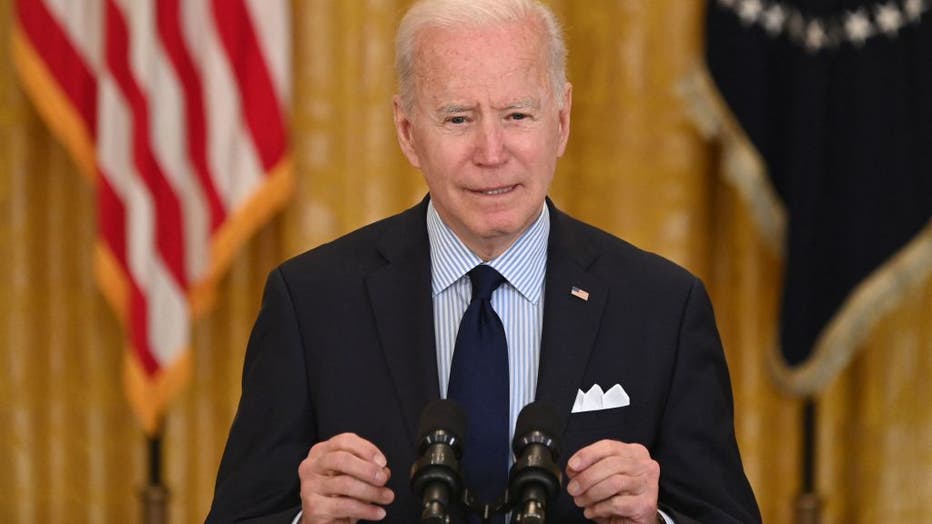Biden says economic recovery a marathon, not a sprint amid weak jobs report
WASHINGTON - U.S. employers added just 266,000 jobs last month, sharply lower than in March and a sign that some businesses are struggling to find enough workers. The report was a speed bump for President Joe Biden’s promised economic comeback and further complicated his proposed $4 trillion plans on infrastructure, education and children.
"When we came into office, we knew we were facing a once-in-a-century pandemic and a once-in-a-generation economic crisis. And we knew this wouldn’t be a sprint — it would be a marathon," Biden said Friday in response to the jobs report.
The economic rebound from the pandemic recession has been so fast that many businesses, particularly in the hard-hit hospitality sector — which includes restaurants, bars and hotels — have been unable to fill all their job openings. Some unemployed people have also been reluctant to look for work because they fear catching the virus.
Others have entered new occupations rather than return to their old jobs. And many women, especially working mothers, have had to leave the workforce to care for children.
In addition, construction companies and manufacturers, especially automakers, have been left short of parts as a result of clogged supply chains and have had to slow production for now. Both sectors pulled back on hiring in April.
With viral cases declining and states and localities easing restrictions, businesses have added jobs for four straight months, the Labor Department said Friday. But as more people have begun looking for work, more people are being counted as unemployed: In April, the unemployment rate ticked up from 6% to 6.1% in March.
Economists had projected roughly 1 million added jobs last month, and the modest hiring indicated that the $1.9 trillion coronavirus relief package has provided an uneven boost so far.
Biden added that his pandemic relief package "was designed to help us over the course of a year, not 60 days. A year. We never thought that after the first 50 or 60 days everything would be fine. Today, there’s more evidence our economy is moving in the right direction. But it’s clear we have a long way to go."

President Joe Biden speaks about the April jobs report in the East Room of the White House in Washington, D.C., on May 7, 2021. (Photo by SAUL LOEB/AFP via Getty Images)
The president’s political opponents say the legislation actually worsened problems in at least one way, with expanded unemployment benefits in Biden’s relief package that gave the jobless a reason to stay at home instead of seeking work. Biden said the jobs report doesn’t show that, and advocates for his plans can argue that the report shows that more spending is needed to sustain the economy.
The U.S. Chamber of Commerce, which represents businesses, put the blame squarely on the relatively generous unemployment benefits. The group said the checks prevent people from accepting jobs.
"One step policymakers should take now is ending the $300 weekly supplemental unemployment benefit," said Neil Bradley, chief policy officer at the Chamber. "Based on the Chamber’s analysis, the $300 benefit results in approximately one in four recipients taking home more in unemployment than they earned working."
RELATED: Chamber of Commerce calls for end to US' enhanced jobless aid
At the same time, optimism about the economic recovery is growing. Many Americans are flush with cash after having received $1,400 federal relief checks, along with savings they have built up after cutting back on travel, entertainment and dining out over the past year. Millions of consumers have begun spending their extra cash on restaurant meals, airline tickets, road trips and new cars and homes.
Most economists expect job growth to strengthen as more vaccinations are administered and trillions in government aid spreads through the economy. Even if another uptick in COVID-19 cases were to occur, analysts don’t expect most states and cities to reimpose tough business restrictions. Oxford Economics, a consulting firm, predicts that a total of 8 million jobs will be added this year, reducing the unemployment rate to a low 4.3% by year’s end.
From month to month, though, the gains in the job market could prove choppy, as Friday's jobs report suggested.
"This sort of stop-start pace of hiring means the job market recovery could be more laborious than hoped," said Leslie Preston, an economist at TD Economics. "We continue to expect that with government stimulus and ongoing vaccinations supporting a release of pent-up demand that hiring will return to a more solid pace over the coming months."
Among industries, the sharpest loss last month was in temporary work, which shed 111,000 jobs. Construction companies added no jobs in April after having added 97,000 in March. Manufacturing lost 18,000 positions after hiring 54,000 the previous month. And transportation and warehousing cut 74,000 jobs after months of solid gains.
By contrast, restaurants, hotels, and entertainment venues — businesses that have complained the loudest about a shortage of workers — added 331,000 jobs in April, even more than their 206,000 increase in March.
In its report Friday, the government also sharply lowered its estimate of March’s job gain to 770,000 from its earlier estimate of 916,000.
RELATED: Hiring ramps up as US adds 916K jobs in March
But job postings are now significantly above pre-pandemic levels, evidence that companies are increasingly confident that business is picking up and that they want to hire. Yet there are still about 4 million people who dropped out of the workforce during the pandemic.
In an encouraging sign in Friday's report, 430,000 people started looking for jobs in April, though not all found work, which is why the jobless rate rose slightly.
The Associated Press contributed to this report.

